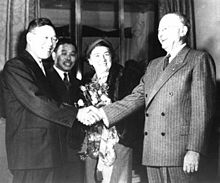- 1 2 3 4 5 6 7 8 9 10 11 12 13 14 15 16 17 18 19 20 21 "Dodge, Joseph Morrell." American National Biography 6, (1999): 690-692.
- 1 2 3 4 Thorsten, Marie. and Yoneyuki Sugita. "Joseph Dodge and the geometry of power in US-Japan relations." Japanese Studies: 1981-2012. Vol. 19. no. 3 (1999):297-314. doi:10. 1080/10371399908727684.
- 1 2 3 4 5 6 7 8 9 10 11 12 13 14 15 16 17 18 "World Trade- Man with a Puzzle." Times Magazine, Jan. 24, 1995
- 1 2 3 4 "World Trade-Budget Observer." Times Magazine, 12-1-1952
- 1 2 3 4 5 6 7 8 9 10 11 12 13 14 Hannan, Caryn. "Dodge, Joseph Morrell." Volume 1 of Michigan Biographical Dictionary. Vol. 1. North American Book Dist LLC, 1998: 207
- ↑ 杉田米行 Sugita, Yuneyuki, and Marie Thorston. Beyond The Line: Joseph Dodge and the Geometry of Power in the US-Japan Relations, 1949-1952. Tokyo: University Education Press, 1999.
- ↑ Schonberger, Howard B. Aftermath of War: Americans and the Remaking of Japan, 1945-1952. Kent, OH: Kent State University Press, 1989
External links
Joseph Dodge | |
|---|---|
 Dodge (right) meets Hayato Ikeda, 1948 | |
| 10th Director of the Bureau of the Budget | |
| In office January 22, 1953 –April 15, 1954 |

